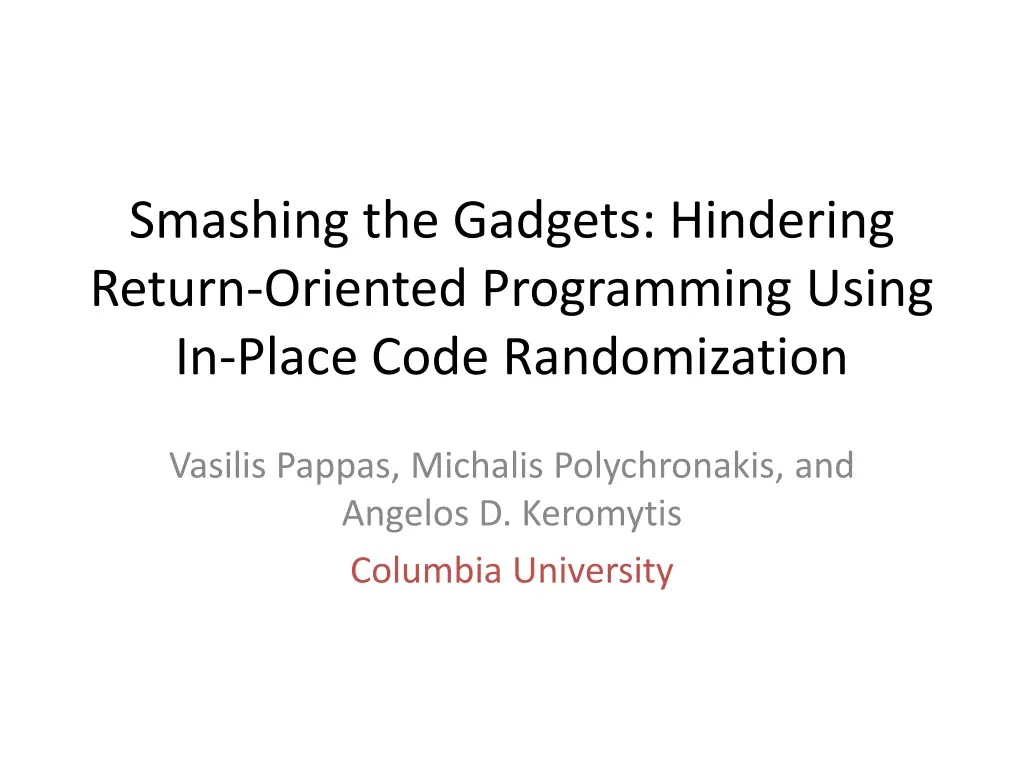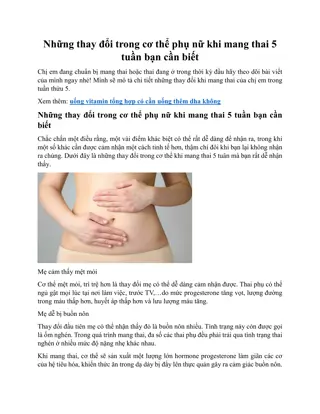
Hindering Return-Oriented Programming Using Code Randomization
"Learn how in-place code randomization can hinder return-oriented programming, as discussed by Vasilis Pappas, Michalis Polychronakis, and Angelos D. Keromytis from Columbia University. Explore machine code-level attacks, ASLR adoption challenges, ROP defenses, and the importance of in-place randomization in enhancing security against machine code-level attacks."
Download Presentation

Please find below an Image/Link to download the presentation.
The content on the website is provided AS IS for your information and personal use only. It may not be sold, licensed, or shared on other websites without obtaining consent from the author. If you encounter any issues during the download, it is possible that the publisher has removed the file from their server.
You are allowed to download the files provided on this website for personal or commercial use, subject to the condition that they are used lawfully. All files are the property of their respective owners.
The content on the website is provided AS IS for your information and personal use only. It may not be sold, licensed, or shared on other websites without obtaining consent from the author.
E N D
Presentation Transcript
Smashing the Gadgets: Hindering Return-Oriented Programming Using In-Place Code Randomization Vasilis Pappas, Michalis Polychronakis, and Angelos D. Keromytis Columbia University
Machine Code-Level Attacks & Defenses Code Injection W X Code-reuse ASLR 5/23/2012 Vasilis Pappas - Columbia University 2
Information Leaks Break ASLR [Ser12] 5/23/2012 Vasilis Pappas - Columbia University 3
ASLR is Not Fully Adopted Executable programs in Ubuntu Linux Only 66 out of 1,298 binaries in /usr/bin [SAB11] Popular third-party Windows applications Only 2 out of 16 [Pop10] 5/23/2012 Vasilis Pappas - Columbia University 4
This Work Code randomization Applicable on third-party applications (Practically) Zero performance overhead 5/23/2012 Vasilis Pappas - Columbia University 5
Overview Background In-place code randomization Results Summary 5/23/2012 Vasilis Pappas - Columbia University 6
Return-Oriented Programming Stack Actions Code 0xb8800000: pop eax ret ... 0xb8800010: pop ebx ret ... 0xb8800020: add eax, ebx ret ... 0xb8800030: mov [ebx], eax ret eax = 1 esp 0xb8800000 0x00000001 0xb8800010 0x00000002 0xb8800020 0xb8800010 0x00400000 0xb8800030 ebx = 2 eax += ebx ebx = 0x400000 *ebx = eax 5/23/2012 Vasilis Pappas - Columbia University 7
ROP Defenses Low High ROPdefender [DSW11] Performance Overhead DROP++ [CXH+11] DROP [CXS+09] Return-less [LWJ+10] G-Free [OBL+10] CFL [BJF11] Program binary Source code Requires 5/23/2012 Vasilis Pappas - Columbia University 8
Why In-Place? Randomization usually changes the code size Need to update the control-flow graph (CFG) But, accurate static disassembly of stripped binaries is hard Incomplete CFG (data vs. code) Code resize not an option Must randomize in-place! 5/23/2012 Vasilis Pappas - Columbia University 9
Randomizations Instruction Substitution Instruction Reordering Intra Basic Block Register Preservation Code Register Reassignment 5/23/2012 Vasilis Pappas - Columbia University 10
Instruction Substitution add [edx],edi ret B 0 0 1 3 A C 3 8 D 4 5 8 0 5 0 6 8 mov al,0x1 cmp al,bl lea eax,[ebp-0x80] add [eax],edi fmul [ebp+0x68508045] B 0 0 1 3 8 D 8 8 D 4 5 8 0 5 0 6 8 mov al,0x1 cmp bl,al lea eax,[ebp-0x80] 5/23/2012 Vasilis Pappas - Columbia University 11
Instruction Reordering (Intra BBL) 8B 41 10 mov eax,[ecx+0x10] 53 push ebx 8B 59 0C mov ebx,[ecx+0xC] 3B C3 cmp eax,ebx 89 41 08 mov [ecx+0x8],eax 7E 4E jle 0x5c 59 push ebx 0C 3B or al,0x3B C3 ret 5/23/2012 Vasilis Pappas - Columbia University 12
Instruction Reordering (Intra BBL) 8B 41 10 mov eax,[ecx+0x10] 53 push ebx 8B 59 0C mov ebx,[ecx+0xC] 3B C3 cmp eax,ebx 89 41 08 mov [ecx+0x8],eax 7E 4E jle 0x5c 41 inc ecx 10 89 41 08 3B C3 adc [ecx-0x3CC4F7BF],cl 5/23/2012 Vasilis Pappas - Columbia University 13
Register Preservation Code Reordering push ebx push esi mov ebx,ecx push edi mov esi,edx . . . pop edi pop esi pop ebx ret push edi push ebx push esi mov ebx,ecx mov esi,edx . . . pop esi pop ebx pop edi ret Prolog Epilog 5/23/2012 Vasilis Pappas - Columbia University 14
Register Reassignment Live regions eax edi function: push esi push edi mov edi,[ebp+0x8] mov eax,[edi+0x14] test eax,eax jz 0x4A80640B mov ebx,[ebp+0x10] push ebx lea ecx,[ebp-0x4] push ecx push edi call eax ... function: push esi push edi mov eax,[ebp+0x8] mov edi,[edi+0x14] test edi,edi jz 0x4A80640B mov ebx,[ebp+0x10] push ebx lea ecx,[ebp-0x4] push ecx push eax call edi ... 5/23/2012 Vasilis Pappas - Columbia University 15
Implementation Orp Focused on the Windows platform Could be integrated in Microsoft s EMET CFG is extracted using IDA Pro Implicitly used registers Liveness analysis (intra and inter-function) Register categorization (arg., preserved, etc.) Randomizations Binary rewriting (relocations fixing, etc.) 5/23/2012 Vasilis Pappas - Columbia University 16
Evaluation Correctness and performance Execute Wine s test suite using randomized versions of Windows DLLs Randomization Coverage Real-World Exploits ROP Compilers 5/23/2012 Vasilis Pappas - Columbia University 17
Randomization Coverage Dataset: 5,235 PE files (~0.5GB code) from Windows, Firefox, iTunes and Reader 90 80 Modifiable Gadgets (%) 70 60 50 40 30 20 10 0 Instruction Substitution Intra Basic Block Reordering Register Preservation Code Reordering Register Reassignment Total 5/23/2012 Vasilis Pappas - Columbia University 18
Real-World Exploits Exploit/Reusable Payload Unique Gadgets Modifiable Combinations Adobe Reader v9.3.4 11 6 287 Integard Pro v2.2.0 16 10 322K Mplayer Lite r33064 18 7 1.1M msvcr71.dll (While Phosphorus) 14 9 3.3M msvcr71.dll (Corelan) 16 8 1.7M mscorie.dll (White Phosphorus) 10 4 25K mfc71u.dll (Corelan) 11 6 170K Modifiable gadgets were not always directly replaceable! 5/23/2012 Vasilis Pappas - Columbia University 19
ROP Compilers Mona.py constructs DEP+ASLR bypassing code Allocate a WX buffer, copy shellcode and jump Q [SAB11] is the state-of-the-art ROP compiler Designed to be robust against small gadget sets Is it possible to create a randomization- resistant payload? 5/23/2012 Vasilis Pappas - Columbia University 20
ROP Compilers Results Non-ASLR Code Base Mona Q Orig. Rand. Orig. Rand. Adobe Reader v9.3.4 Integard Pro v2.2.0 Mplayer Lite r33064 msvcr71.dll mscorie.dll mfc71u.dll Both failed to construct payloads from non-randomized code! 5/23/2012 Vasilis Pappas - Columbia University 21
Summary In-place code randomization Requires no source code or debug symbols (Practically) Zero performance overhead Breaks 80% of gadgets Prevented real exploits and ROP compilers Get the code (Python): http://nsl.cs.columbia.edu/projects/orp 5/23/2012 Vasilis Pappas - Columbia University 22
References [Ser12] Fermin J. Serna. The case of the perfect info leak, 2012. http://zhodiac.hispahack.com/my-stuff/security/Flash_ASLR_bypass.pdf. [SAB11] Edward J. Schwartz et al. Q: exploit hardening made easy. USENIX Security, 2011. [Pop10] Alin Rad Pop. Dep/aslr implementation progress in popular third-party windows applications, 2010. http: //secunia.com/gfx/pdf/DEP_ASLR_2010_paper.pdf. [Sha07] Hovav Shacham. The geometry of innocent flesh on the bone: return-into-libc without function calls (on the x86). CCS, 2007. [CDD+10] Stephen Checkoway et al. Return-oriented programming without returns. CCS, 2010 [BJFL11] Tyler Bletsch et al. Jump-oriented programming: a new class of code-reuse attack. ASIACCS, 2011. [LZWG11b] Kangjie Lu et al. Packed, printable, and polymorphic return-oriented programming, RAID, 2011. [DSW11] Lucas Davi et al. Ropdefender: a detection tool to defend against return-oriented programming attacks. ASIACCS, 2011 [CXS+09] Ping Chen et al. Drop: Detecting return-oriented programming malicious code, ICISS, 2009. [CXH+11] Ping Chen et al. Efficient detection of the return-oriented programming malicious code, ICISS, 2011. [OBL+10] Kaan Onarlioglu et al. G-free: defeating return-oriented programming through gadget-less binaries. ACSAC, 2010. [LWJ+10] Jinku Li et al. Defeating return-oriented rootkits with return-less kernels. EuroSys, 2010. [BJF11] Tyler Bletsch et al. Mitigating code-reuse attacks with control-flow locking. ACSAC, 2011. 5/23/2012 Vasilis Pappas - Columbia University 23






















